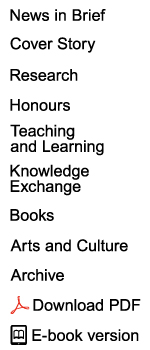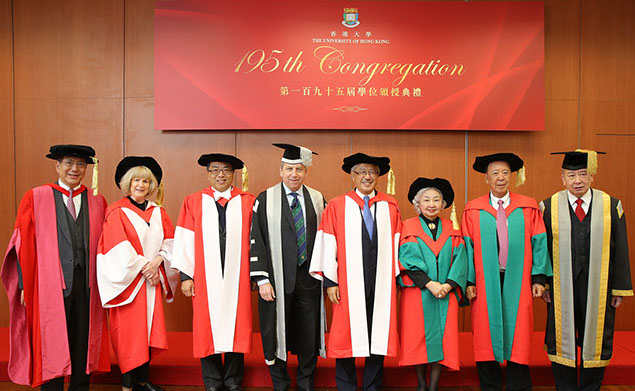
From left: Council Chairman Professor the Honourable Arthur Li, Dr Mary-Claire King, Professor Lap-Chee Tsui, President Peter Mathieson, Dr Victor Joseph Dzau, Dr the Honourable Elsie Leung Oi-sie,
Dr the Honourable Lui Che-woo and Pro-Chancellor Dr the Honourable David Li Kwok-po.

HONOURING THOSE
WHO GIVE BACK
The 195th Congregation of the University of Hong Kong conferred Honorary Degrees on five individuals who are not only outstanding in their f ields, but have also applied their abilities to benefit wider society.
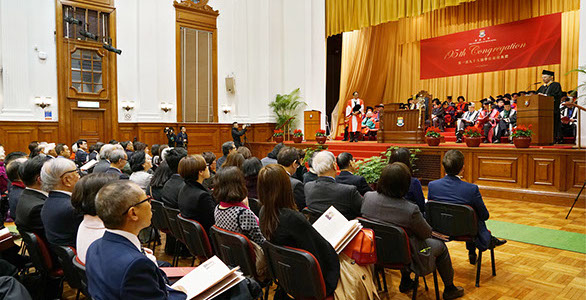
The individuals are cardiologist and global health care leader Dr Victor Joseph Dzau, geneticist
Dr Mary-Claire King, geneticist and HKU’s 14th Vice-Chancellor Professor Lap-Chee Tsui, Hong Kong’s first Secretary for Justice Dr the Honourable Elsie Leung Oi-sie and businessman and philanthropist Dr the Honourable Lui Che-woo.
Professor Tsui delivered the acceptance speech on behalf of the Honorary Graduates, in which he noted that globalisation had greatly increased the demand for individuals with multiple skills who could innovate and lead. This made it incumbent that universities not only create and transmit knowledge and train competency in their students, but also instil value in the next generation of leaders.
Professor Tsui, who led HKU from 2002 to 2014, noted that his proudest achievement here was “building a cohesive university family of staff, students, alumni and friends” and he encouraged the University family to continue to work together and achieve excellence.
“When I was here at HKU, I had a group of absolutely brilliant and hardworking staff, both academic and non-academic, and a bunch of most loyal alumni and highly supportive friends,” he said.
“I am sure you will work with Professor Mathieson in the same spirit of partnership and commitment that you did with me, and I look forward to seeing this great university of Hong Kong continue to go from strength to strength in the years to come.”
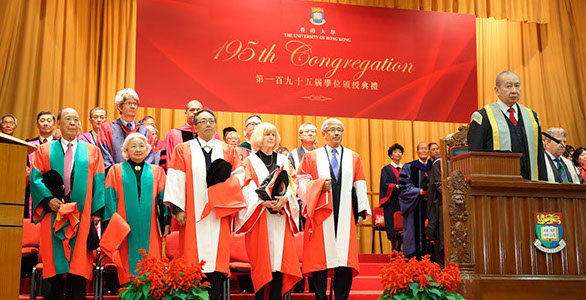
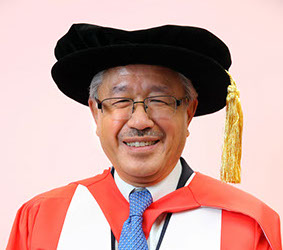
A VISION FORGED IN CHILDHOOD
Dr Victor Joseph Dzau
Doctor of Science honoris causa
Dr Dzau, the President of the National Academy of Medicine in the United States and Vice Chair of the Governing Body of the National Research Council, is a renowned physician and scientist who has the rare distinction of making an impact in two fields: cardiovascular medicine and genetics, and health care innovation and global health.
The latter in particular was influenced by his childhood experiences. Dr Dzau was born in Shanghai in 1945 and his family fled in 1950 to start a new life in Hong Kong. Years later, his post-war experiences fed his passion for addressing global health inequality. At Duke University, where he is Chancellor Emeritus and James B Duke Professor of Medicine, he helped to launch the Duke Global Health Institute, among other initiatives. He has also advised many governments, companies and universities, serves on the Board of Health Governors of the World Economic Forum, and recently received the Project HOPE Global Health Partner Award for his contributions to global health care services.
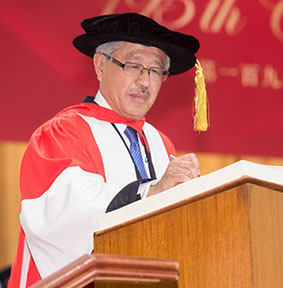
These achievements are significant in their own right, but Dr Dzau also transformed the field of cardiac regeneration through his work on the rennin angiotensin system in cardiovascular disease and gene therapy for cardiovascular disease. His research has benefited many people suffering from heart and blood vessel disease, ranging from hypertension to heart failure.
A guiding principle in Dr Dzau’s work has been to embody the concept of translational medicine, from ‘bench to bedside’, and to give back to society by bringing his understanding of health, social inequality, clinical practice and science to the policy arena.
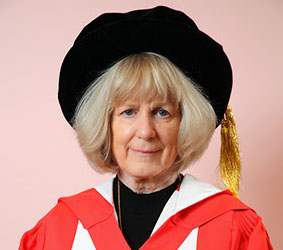
A GENETIC SLEUTH AND PIONEER
Dr Mary-Claire King
Doctor of Science honoris causa
Geneticist Dr King has made a career of putting forth radical ideas that then become conventional wisdom and has used her considerable talents to not only inform medicine, but also advance human rights issues.
Her groundbreaking work started with her doctoral thesis at the University of California at Berkeley, where she proved that humans and chimpanzees were genetically 99 per cent the same.
She then followed a hunch that cancer could be genetic, at a time when a viral explanation was favoured, and became the first to show that breast cancer is inherited in some families through mutations in the gene she named BRCA1. This important work facilitated and encouraged early screening in women for breast cancer. Since 1990, Dr King has also collaborated with other scientists to identify the genetic causes of hearing loss and deafness.
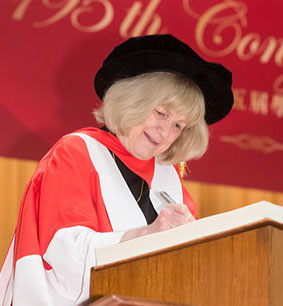
Dr King has also applied her knowledge of genetics to human rights causes. She has worked with numerous human rights organisations to identify, through DNA testing, missing persons in Latin America, the Balkans and the Philippines, and has assisted the United Nations’ war crimes tribunals.
Dr King has said: “We are extraordinarily fortunate to be living in this era of exciting discoveries and rapid scientific advancements in human genetics. There has not been a more exciting time since Gregor Mendel counted smooth and wrinkled peas and Charles Darwin tended finches.” Her work has added to the excitement by changing critical thinking about the genetics of common complex diseases.
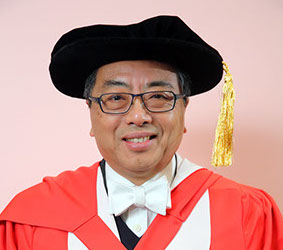
LEADING BY EXAMPLE
Professor Lap-Chee Tsui
Doctor of Science honoris causa
Professor Tsui has had two careers in academia and in both he has demonstrated remarkable talent and achievement. He made his mark as a molecular geneticist at the Hospital for Sick Children in Toronto, where he identified the gene that caused cystic fibrosis, and he made his mark as the Vice-Chancellor of HKU, where for 12 years he steered the University through an exciting period of change and achievement.
Professor Tsui has said that his painstaking work on cystic fibrosis was analogous to trying to find a particular house in the world without knowing which continent it was on – he and his team eventually discovered that just three of 250,000 base gene pairs were missing among those suffering from the illness. This major breakthrough in human genetics contributed to treatment strategies for those afflicted. It also made Professor Tsui prominent in the field and he was President of the Human Genome Project from 2000 until 2002, when he joined HKU.
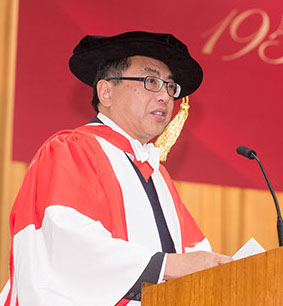
Here at the University, he is warmly regarded for his vision and leadership as Vice-Chancellor. He made internationalisation a priority, both in student recruitment and research. He also oversaw major changes including the expansion to a four-year curriculum from three years and the building of the magnificent new Centennial Campus.
Professor Tsui also was a great advocate of academic freedom and freedom of speech, and encouraged staff and students to use their talents to help those less privileged and to pursue civic engagement. In the University community, he is fondly regarded for his modesty and integrity, and for being a leader who stands behind his team.
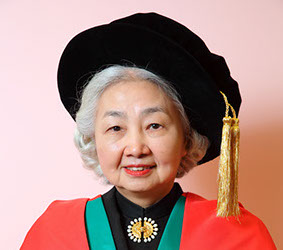
HKSAR’S FIRST
SECRETARY OF JUSTICE
Dr the Honourable Elsie Leung Oi-see
Doctor of Social Sciences honoris causa
Dr Leung is a third-generation Hongkonger who knew from her school days that she wanted to be a lawyer. In the early 1960s the only route was to article for five years with a local law firm and, needless to say, there were very few women lawyers at the time. She went on to succeed in her field well beyond these simple beginnings.
She was admitted as a Hong Kong solicitor in 1968 and apart from law, took a keen interest in public service and politics. She worked with disadvantaged people through such organisations as the Hong Kong Federation of Handicapped Youth and the Hong Kong Family Welfare Society, helped to establish the Hong Kong Federation of Women Lawyers, and became a Founding Member of the Democratic Alliance for the Betterment and Progress of Hong Kong. She also found time to complete her LLM at HKU in 1988, graduating in the first cohort of that programme.
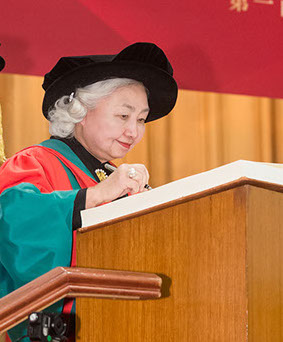
Her involvement in the community led to
Dr Leung being appointed a delegate to the Guangdong Provincial People’s Congress from 1988 to 1993 and to the National People’s Congress (NPC) from 1993 to 1997. In 1997 she was appointed the first Secretary of Justice of the Hong Kong Special Administrative Region (HKSAR), a position she held for eight years. She had the enormous task of ensuring the smooth transition of sovereignty and the implementation of the Basic Law, Hong Kong’s mini-constitution, and she handled the many demanding and controversial issues with determination and integrity.
Dr Leung currently is the Deputy Director of the HKSAR Basic Law Committee under the NPC’s Standing Committee. As such, she continues to contribute to Hong Kong’s development.
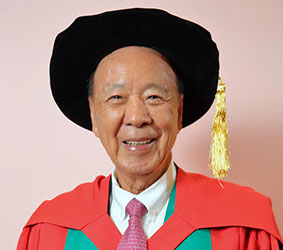
PHILANTHROPY FOR THE FUTURE
Dr the Honourable Lui Che-woo
Doctor of Social Sciences honoris causa
Fate denied Dr Lui a proper education. He managed to make his fortune through an entrepreneurial spirit and a keen eye for a good opportunity, but he continued to nurture an appreciation for education and its contribution to society’s advancement.
Dr Lui was born to a well-off family in Guangdong in 1929 but in 1934 they were forced to flee to Hong Kong. His schooling here was cut abruptly short by the Japanese invasion in 1941 and by age 13 he was selling snacks on the street. After the war he took evening classes and became a stock-keeper in a car parts shop, eventually becoming the shop owner. Then, just after the Korean war, a friend mentioned the US army had left behind a great deal of machinery on Okinawa. Dr Lui bought it cheaply and from there, was on the road to great business success. In 1955 he founded K. Wah Company which, over the next 60 years, grew into one of Asia’s largest conglomerates.

Dr Lui is now one of Asia’s richest people, a privilege he has used to further his philanthropic interests. He has been especially supportive of health care, education and information technology. At HKU he was a Founding Honorary Patron of the HKU Foundation and has made substantial donations.
More recently, Dr Lui established the Lui Che Woo Prize – Prize for World Civilisation in 2015 to award outstanding achievements in sustainable world development, the betterment of mankind, and the fostering of a positive life attitude and the enhancement of positive energy. In Dr Lui’s words, the prize “is like sowing a seed and I sincerely hope that it will blossom one day to make the world a better place.”

